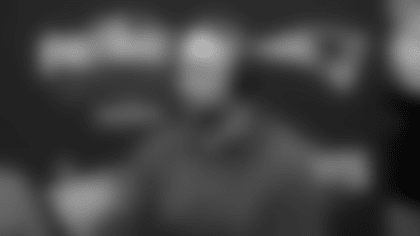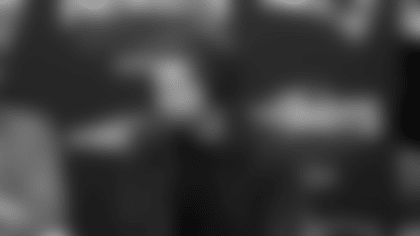BB: The players are off today, so it gives a little chance – we've had a couple good work days here, several in the past week or so – so this will give us a good chance to get a little rest and recover a little bit here and then be ready to go for a couple more sessions here before we have to reduce our roster and then fully turn our attention to Miami. From a staff standpoint, also, it gives us a chance to kind of get caught up on a few things here that have been piling up and obviously some of the decisions that we'll have to make. So, we'll get a little bit of a head start on some of those conversations and so forth. I thought we had a couple good days here at the start of the week. It's good to see those start to string together a little bit. Obviously, we still have a long, long way to go, but the players have worked hard. They've really improved a lot from not only where we started, but even a few days ago. That's encouraging. I think if we can maintain our work ethic and our discipline and continue to build that consistency, then we'll be on the right track, even though it will be a long trip.
Q: What have you seen from the competition at wide receiver? When putting together that group, how much consideration is there to having a diversity of skillsets and sizes?
BB: Right, well, I think the second question first – more than the physical skillset really is the position that the receivers play. So, we have outside receivers and we have inside receivers and then have receivers that can, let's say, play both or have some combination of skills where they can play both spots. All three are important. Some guys can be outside only, some guys can be inside only, some guys can have that flexibility. In the end, I think it's really more about production and performance, although size and skillset plays a part in that, as well. They are related, but really the most important thing is to be productive. We've had them in different shapes and sizes. We had Deion Branch and Randy Moss. They were both outside receivers and couldn't be more different. But, I think the typical stature of certain positions – I think that can be identified, but if there's an exception to that and the guy is a good player, then that's OK, too. Competition at that position has been good. As always, that's the type of position where you can really see an individual highlight play or a play that may not be as good – a dropped ball or a spectacular catch – and those plays are a lot more visible and really easily identifiable relative to an interior line play or that type of thing. Now, again, with that position, it's important to develop consistency. There's a lot of time receivers are open, but the ball is thrown to the other side of the field or they're covered, and so that's all part of it, too. It's not just those highlight plays that everybody sees but really the evaluation of the player's consistency to win his route or block the player that he's supposed to block in the running game as part of the run force and so forth. I think there are a lot of things at that position that are subtle to the naked eye, and it really comes down to, again, that play-after-play consistency. The highlight plays stand out – and they're important, too, one way or the other – but I would say the consistency overall is also something that you can't lose sight of.
Q: With no work against other teams this preseason, have you had to change the criteria that you use for evaluating strengths and weaknesses in terms of setting up the final roster? Has it been more difficult than normal?
BB: Well, I think there are a few more questions than normal, yes, just because there's less to evaluate. So, that's always the case anytime you have less information – probably you're a little less certain than you are when you have more information. Again, we've dealt with this before where players might play in one or sometimes no preseason games, and then you're kind of left in that same spot. They practice for a week or so and then come back at the end of preseason but either aren't able to play or don't play in the last preseason game, and it's the same conversation we're having right now. So, we've been there before, but usually that's with a limited number of players. This year, it's with everybody. We'll just have to take the information that we have, the competition that we've had on the field, both in one-on-one drills and group drills and team drills, and also there are some things that we do that our opponents don't do as much of. So, a player may look a little better or maybe a little worse against our team based on what he's working against and what we do than maybe what the norm is out there. We have to take that into consideration, as well. It's a little bit of projection, and other teams have kind of the same conversation. We're all playing on the same field, we just have to do the best we can with the information and knowledge that we have and make the decisions that we feel are best for the team. So, that's what we'll try to do here in the next few days.
Q: We've seen a lot of guys take reps at the two return spots. How have you liked the competition for those roles?
BB: Yeah, it's a similar question really to what Alan [Segel] just asked. The return position in particular is a little bit like the running back position. It's really hard to tell how those guys do with the ball in their hands based on the limited amount of live tackling we've done as a team. Now, we've done individual tackling and fundamental tackling, but we've limited the live tackling reps. And that's really where those guys excel, right, is in the open field with the ball in their hands. Can they make the first guy miss? Can they gain extra yards in the open field with their return skills? How do they handle the ball with the decision making with guys on them or fair catching or sort forth, setting up blocks and showing their strength, their quickness or run instincts in a live setting as opposed to a team setting where generally we are tagging off? So, it makes that a little bit of a tougher evaluation, and again, we'll just have to do the best that we can there. But, I think that we have a number of players that have shown promise in practice. I think it's a leap of faith to just go from practice to the game, especially at that position. Troy [Brown] I think has done a great job of working with those guys and they've improved tremendously in the last month in terms of their ball handling, decision making, overall technique, awareness of the coverage, distribution and what to do. So, we're catching the ball better, we're making better decisions, we're doing more things right and understanding what to do right, but what that will really look like in live competition is a little hard to say with certainty. So, it will be a couple tough decisions how we're going to handle that. We've already talked about that relative to those players who also have skill at other positions, so we're not just talking about guys that are just pure returners. So, you evaluate their return ability versus how the player does something else – plays defense or is a receiver or a running back or whatever it happens to be. All the guys that we're talking about have other skills, as well, so it will really be a combination of factors that go into that decision and that competition, which that will make for some interesting discussions here in the next couple of days. But, it's a competitive spot and it will probably be, I'd say, not a clear-cut – you know, we're going to have to see how this goes a little bit. Obviously, we have a couple guys back there with experience. Obviously, Julian [Edelman] as a punt returner has done that throughout his career, but that's something that we haven't used him as much on as in the past, and I think that's probably the right thing to do. Although, we'll certainly need his availability at some point, I'm sure.
Q: How are you and your staff grappling with the idea that perhaps that first game against Miami will be the first time in which guys are tackled to the ground? Is there going to be a point at which you give a window for these guys to hit, or how are you approaching that?
BB: Yeah, well, we've had plenty of contact in practice, so I wouldn't say that that's an area that we're necessarily deficient in. The contact in the game is a little bit different, but we've dealt with really, I'd say, all kinds of contact. We've live tackled, we've tackled guys to the ground, but we've done it more of a one-on-one setting as opposed to game conditions. Now, we've done some in game conditions, too – we've tackled live as a team in a few selected drills, but not extensively. That's for the safety of the players. But, we have had contact and we've had contact and we've tackled and the runners have taken contact with the ball in their hands and the tacklers have had to get guys on the ground like we're going to have to do. So, I'm sure that's a skill that we'll have to acquire a little bit, as we always do. And it's similar in preseason, honestly, if you look at how many tackles some of the guys that play a lot in the regular season make in preseason. I don't think you're talking about numbers that are up in the dozens and the hundreds or anything like that. It might be a couple here and there, but that's really about what it is. So, we'll be less than that, but I would say it's not a whole lot different than what it normally is. We'll have to see how it goes, but I think we've prepared our players for that, I think they've had their opportunities to feel the contact and to feel as close to game reps as we can get without playing in a game. There's another level that we'll have to experience, but I think we'll be prepared to take that next step, and then we'll have to refine it from there. I don't think it will be perfect, but I think it will be competitive and we'll continue to work and improve on it.
Q: Joe Judge had Daniel Jones take off the red jersey in practice to get him jostled around a little bit. Would you do that with your quarterbacks?
BB: Yeah, we'll do what we think is best for the team, Tom [Curran], same as we always do.
Q: We've talked this offseason about the similarities and differences between this year and 2011. In 2011, it looked like the offensive numbers from early in that season were pretty high, especially in the passing game. Do you remember any trends that year that led to that offensive output and do you have to be aware of that going into this season?
BB: Yeah, well, I'd say we're going to try to perform well in all three areas of the game – offense, defense and special teams. So, that's what our goal and objectives are. That's what we're going to try to do. I think anytime you have a high offensive output, that's a combination of good offense and probably bad defense, and vice versa. A lot of times when you have low offensive output, it's a combination of good defense and bad offense. So, we're going to try to eliminate as many bad plays as we can and try to have as many good plays as we can. But, I don't want to live in the past and worry about the past. I want us to try to be as good as we can be at all the things that we do, and that's what we're going to try to do.
Q: Did you think that those high offensive numbers may have had anything to do with limitations when it came to tackling that year?
BB: Yeah, again, there's so many individual situations that we could talk about there. I don't know. I'd have to go back and study it more closely, but again, I would say when you have high offensive output, I mean certainly credit goes to the offense for their execution, but I would say unequivocally that there's also some bad defense in there that goes with that good offense and vice versa. So, in the end, great players are going to make some great plays and they're hard to defend, but when you don't play good defense and you just give up easy plays, then that's not really a statement of great offensive football, necessarily. It's more bad defensive football. We'll see. Yeah, we'll see. I don't know. We'll see how it goes.
Q: Deatrich Wise acknowledged that he bulked up a little bit this offseason. Would that allow him to move around a little bit more or potentially play different positions on your defense? I know it might be minimal, but how much of an impact can that make?
BB: Well, I think Deatrich is a very unique player. He has such a big frame and a good frame. He's the type of player that can put on a significant amount of weight based on the scale and not really look too much different. I think that's really been the case. I know we talked about that when the season was over, we've talked about it several times since then, but I think the weight that he's put on has been good weight. He's worked hard at it. He doesn't look a lot different than what he looked like before or last year at a lower weight. So, I think his play has improved. I think some of that is due to technique and experience, but he is a little bit bigger and a little bit stronger. I think that's a good thing, not a bad thing, but in the end, I think the major improvement in his play from what I've seen so far this year in training camp has been his technique, how quickly he reads and reacts and recognizes plays and just improving in some of the fundamentals. He's a very hard worker, and he's the type of kid that when you ask him to work on something, he really goes all in and makes a strong commitment to try to improve it and make it better. That's been evident this year in the areas that he's dedicated himself to improve in and that's shown up on the field. So, I've really been impressed with what he's been able to do so far.







































